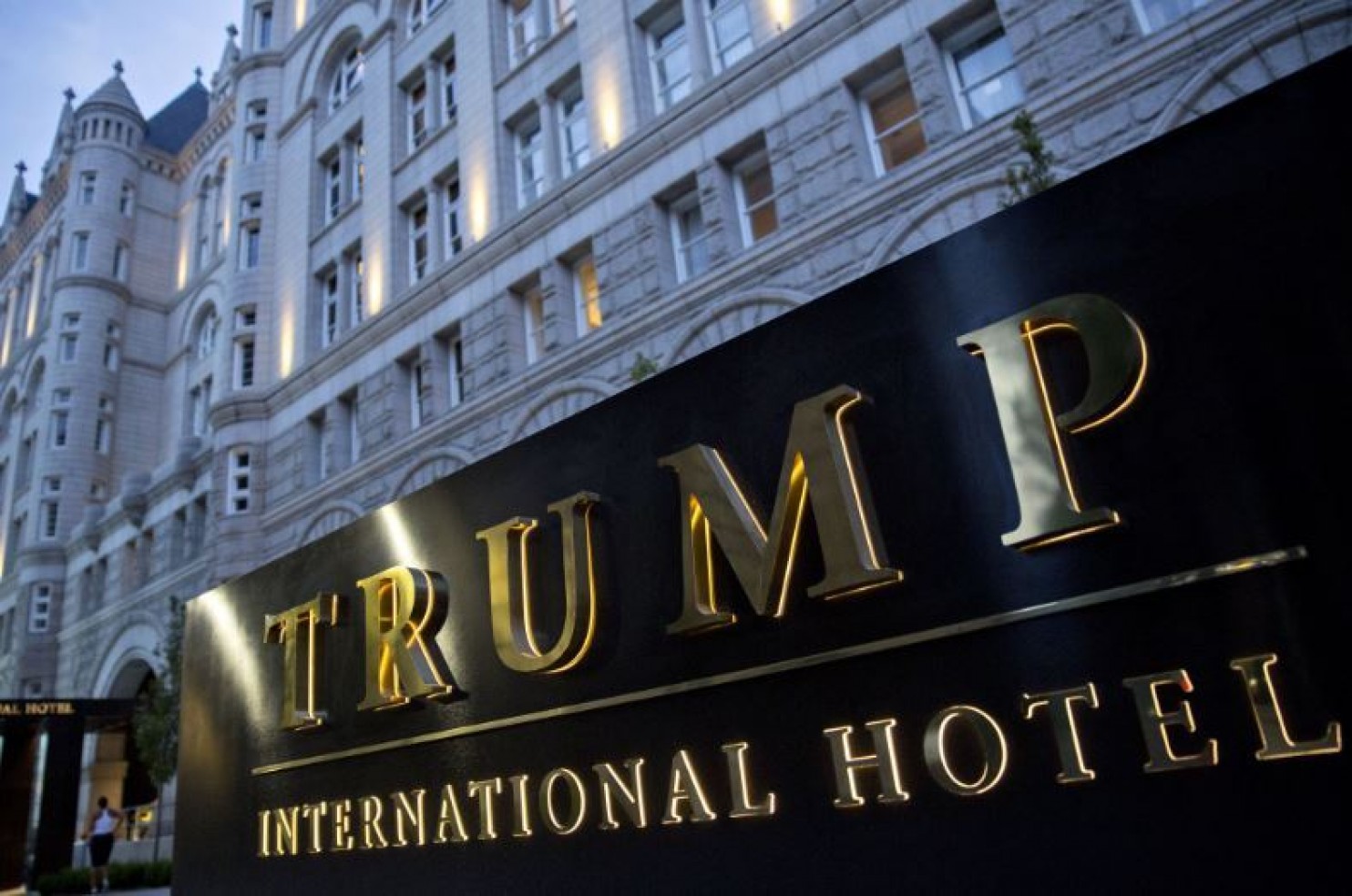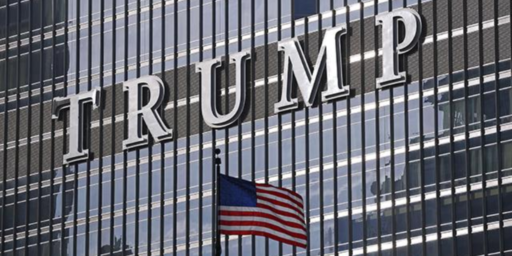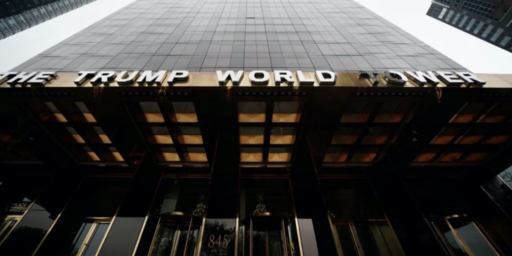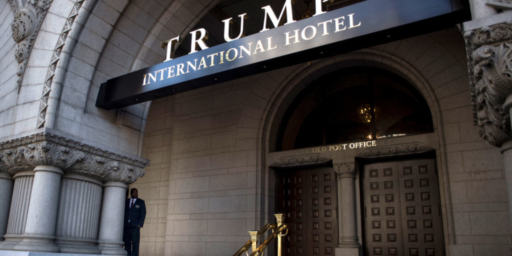Supreme Court Rules Trump Emoluments Cases Moot
A legally correct but maddening ruling.

CNN (“Supreme Court dismisses emoluments cases against Trump“):
The Supreme Court declined on Monday to hear a case concerning whether former President Donald Trump violated provisions of the Constitution that bar a president from profiting from a foreign government.
The court instructed the lower courts to wipe away previous lower court opinions that went against Trump because he is no longer in office. It leaves unresolved a novel question raised in the case because Trump, unlike other presidents, did not use a blind trust when he assumed the presidency, but instead continued to retain an interest in his businesses and let those businesses to take money from foreign and domestic governments.
The order was issued without comment or dissent.
There were two cases covering the issue before the justices. One was initiated by lawyers for Maryland and Washington, DC, who argued Trump violated the Constitution by accepting payments from foreign and domestic governments through the Trump International Hotel in DC. They said they were disadvantaged in competing for business from foreign and state officials who may choose to do business with entities in which the President had a financial interest in order to curry favor.
A second case was brought by various members of the hospitality industry who own or work in hotels or restaurants in New York and Washington, who also argued they were put at a competitive disadvantage.
Deepak Gupta, one of the attorneys challenging Trump in the disputes, said on Twitter following the court’s decision that he wasn’t surprised the case was dismissed as moot after Trump left office, adding it’s “disappointing that Trump ran out the clock.”
AP (“Supreme Court ends Trump emoluments lawsuits“) adds:
The high court’s action was the first in an expected steady stream of orders and rulings on pending lawsuits involving Trump now that his presidency has ended. Some orders may result in dismissals of cases since Trump is no longer president. In other cases, proceedings that had been delayed because Trump was in the White House could resume and their pace even quicken.
[…]
The outcome leaves no appellate court opinions on the books in an area of the law that has been rarely explored in U.S. history.
NYT‘s Adam Liptak (“Supreme Court Ends Emoluments Suits Against Trump“) adds:
The move means that there will be no definitive Supreme Court ruling on the meaning of the two provisions of the Constitution concerning emoluments, a term that means compensation for labor or services. One provision, the domestic emoluments clause, bars the president from receiving “any other emolument” from the federal government or the states beyond his official compensation.
The other provision, the foreign emoluments clause, bars anyone holding a federal “office of profit or trust” from accepting “any present, emolument, office, or title, of any kind whatever, from any king, prince, or foreign state” without the consent of Congress.
At WaPo, Robert Barnes and Ann E. Marimow (“Supreme Court ends lawsuits alleging that Trump illegally profited from business interests“) add:
The question has rarely been presented because presidents rarely maintain active business interests in office, as Trump did. Much of the litigation turned on the president’s interest in the Trump International Hotel on Pennsylvania Avenue, near the White House, which became a magnet for foreign dignitaries and others doing business with the government.
The litigation was consumed with questions about who had the right to bring such a suit, and legal questions without precedent.
[…]
Their case was one of three testing for the first time the Constitution’s ban on the country’s leaders engaging in private business relationships with foreign governments.
The Supreme Court declined in October to take up a case brought by Democratic members of Congress led by Sen. Richard Blumenthal (D-Conn.) and Rep. Jerrold Nadler (D-N.Y.). The lawmakers had appealed a D.C. Circuit ruling that blocked individual members of Congress from trying to enforce the foreign emoluments clause.
In a third case in New York, brought by the nonprofit watchdog group Citizens for Responsibility and Ethics in Washington (CREW) on behalf of Trump’s hospitality industry competitors, a three-judge panel of the U.S. Court of Appeals for the 2nd Circuit said a lower-court judge had improperly thrown out the case in late 2017.
The fact that there was no noted dissent in the cases and that seasoned court watchers found the ruling unremarkable leads me to believe this was both expected and routine.
That said, despite the bloviating from various plaintiff’s attorneys quoted in the linked pieces, this was a bad outcome in a myriad of ways.
First and foremost, if the case automatically becomes moot when a President leaves office, it behooves the Supreme Court to expedite action. Otherwise, the Emoluments Clauses have no real meaning.
Second, this is an example where “mootness” is simply applied too broadly. The fact that Trump’s abuse of his office is no longer an active matter does not undo the damage that it did for four years. While there is no longer a remedy available in terms of ceasing and desisting from further action, plaintiffs who suffered monetary damage should surely have a legal remedy. (Although it’s conceivable that there remain tort remedies in and apart from the Emoluments issue; it’s well outside my lane.)
Third and related to both of the above, regardless of whether any of the plaintiffs had a remedy, the public has a rather strong interest in clarifying these issues and establishing precedents for future office holders. While I continue to think Trump was sui generis and future Presidents will neither have massive business interests when they take office nor refuse to follow the norms of divestment, that’s not a certainty. We shouldn’t have to wait for another crisis and let the matter wind its way slowly—perhaps, too slowly—to the Supreme Court again for resolution.





This is the key. Your headline should actually read, “Republicans on Supreme Court Deliberately Delayed Action Until Case Became Moot.” If you believe their failure to expedite wasn’t political, I’ve got a David Brooks I’d like you to meet…
I hesitate to say this ruling is complete BS, based solely on the fact that no justices saw fit to even scribble a dissent. But in effect the office of the president of the United States is now a limited liability corporation, subject to a time limit.
Remember the argument that announcing a withdrawal date from Iraq effectively gave victory to the insurgents, as then all they had to do was run out the clock and declare vitory?
Well, here it is.
@MarkedMan:
As Kathy pointed out, no justices dissented. They may well all be glad to be rid of Trump–even Gorsuch, Kavanaugh, and Barrett. After all, they’ve “betrayed” him before, to his way of thinking.
Another reminder of how cowardly the Roberts court is. They actively look for excuses to not make a ruling. It’s carrying judicial restraint and prudence too far.
Not at all surprising of course. This is the same court that decided that political gerrymandering was incompatible with basic principles of democracy, but also Wasn’t Their Problem.
I think the Supremes just guaranteed that future presidents will fail to follow the old norms of divestment.
The Supremes just announced there’s no reason to divest. Unless Congress backs up the Constitutional language with statutes. And if they do, it’ll have to be civil penalties because we have a facially silly DOJ opinion we can’t go after the prez for crimes if his party has at least 34 senators. But Biden, Pelosi, and Schumer are consumed with other priorities right now and McConnell doesn’t care.
@CSK:
I’m not questioning this ruling. It was the courts decision not to expedite the case that was political. Essentially approving that a President claiming a constitutional right to accept bribes could be slow-walked through the system, dragging everything out until the case became moot.
@MarkedMan: Dang. No edit. That should read, “… a Republican President…”
@MarkedMan:
Good point.
But I still think the justices might have wanted to be rid of Trump. That isn’t particularly honorable. But I understand it.
@gVOR08:
Civil penalties can hurt. there’s a legal precedent, I believe, for triple damages in antitrust law. One could also impose huge punitive damages.
But there’s no reason to limit any statute to civil penalties. Even if a president, or a trump, cannot be prosecuted while in office, they can be indicted and prosecuted after they leave office. Naturally the statute of imitations should count from the moment prosecution is possible, not before.
@MarkedMan: During the previous administration’s worst and most litigious moments there was lots of delay. It seemed obvious to me that there should have been something like a special ‘Constitutional Court’ formed that would hear cases involving the President’s rights and non-rights under the Constitution. And hear them promptly.
Alas. Our democracy is sclerotic and unwieldy.
Moot?
Dude earned money during his tenure. That money did not disappear on 1/20. No blind trust.
Still salient in my book, but IANAL R version.
Certainly norm busting.
SCOTUS punting on this is a bad look and cowardly.
The US constitution is a wondrous thing. One of its outstanding virtues is that attempts to correct breaches of it often fail because it’s not clear who has “standing” to take the case to court.
The larger point is that Americans have become too reliant on courts to resolve political controversies. In a healthy democracy, no major party would have nominated Trump for the presidency without guarantees that he would divest himself of all his blatant conflicts of interest. The media would have concentrated on his failure to give those guarantees and forgotten about Hillary’s stupid email server. And voters would never have elected a man so corrupt.
But America is not a healthy democracy, a problem which is not going to be solved by any number of Supreme Court decisions.